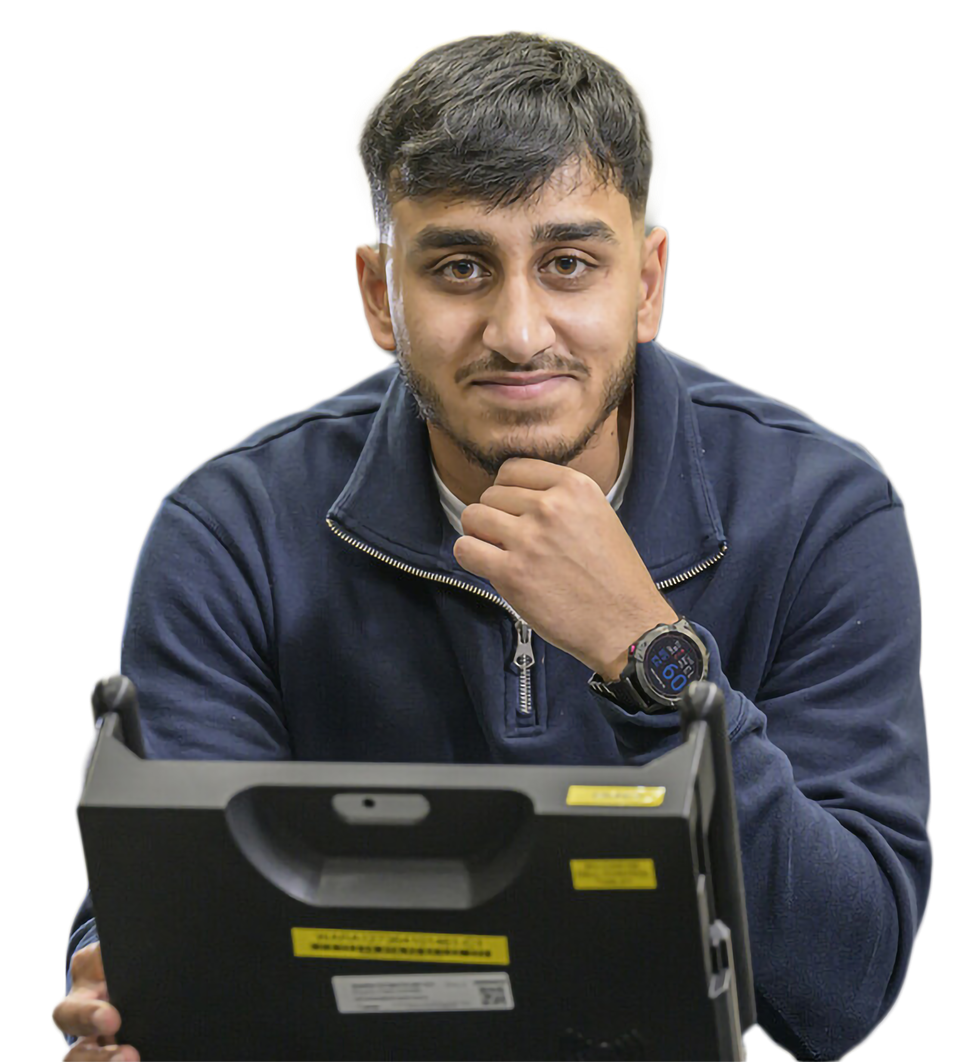YUSUF, 22, is a third-year manufacturing technician apprentice at BAE Systems in Lancashire, working on military aircraft programmes.
“My favourite thing about my apprenticeship is the variety. I’m training to become a Level 4 manufacturing technician, which allows me to be incredibly hands-on with the aircraft we’re developing, as well as having an office-based role focused on problem-solving.
“This type of blended experience – being able to be on the factory floor or in the office and the ability to study while I work – suits me down to the ground.
“I’m the first person in my family to do an apprenticeship. I was lucky as my high school was great at making us aware of all the opportunities available beyond university. I speak to so many young people who aren’t familiar with apprenticeships, or what they can offer, and have ended up on a path that doesn’t suit how they learn or their ambitions.”
Yusuf grew up and went to school in Lancashire. It was at school he first heard about BAE Systems and the possibility of kick-starting his career as an apprentice.
“From the first time we were introduced to BAE Systems, I knew it was the place for me, offering a well-paid job and securing a role while gaining my qualifications. I’ve always had a passion for engineering, and when I saw other Asian people working at BAE Systems, I thought, ‘I want that to be me.’”
“While I was certain about an apprenticeship at BAE Systems, I wasn’t initially accepted. Instead, after my GCSEs, I studied for a Level 3 engineering course at college, but I wasn’t the type who thrived by studying for tests.
“However, I’m very driven! After my college course, I worked at a call centre for a year whilst I focused on my application to BAE Systems, and on my third attempt, I was accepted.
“I’m now in the third year of my apprenticeship. So far in my role, I’ve supported both the development of the Tempest, the next-generation fighter jet for the Royal Air Force, and the implementation of innovative technologies in our Factory of the Future.
“What interests me the most is how technology can support more traditional methods of building an aircraft – I love seeing the advancements of technology. BAE Systems allows me to be right at the forefront of these endeavours.”
Yusuf is conscious that while people may have heard of an apprenticeship, they aren’t entirely aware of what it can offer, both now and in the future.
“There are a lot of misconceptions about apprenticeships – I’ve heard plenty of people say that it’s an easier route. That’s definitely not the case. The challenges are relative to what suits you and the environment you’re in, whether that is a classroom or a factory floor.
“My apprenticeship gives me a lot – the opportunity to meet many different people and learn lessons a teacher could never deliver in a traditional setting. However, it also requires balancing a full-time job while getting an education – it can be tiring, but what I get in return makes up for it.
“Most importantly, the opportunities don’t end with my apprenticeship. BAE Systems is full of talented senior leaders who started their careers as apprentices and now work across the UK and the world at the very forefront of innovation.
“Looking ahead, BAE Systems operates across more than 40 countries, and I would love to take up a role abroad for a while. One thing that is certain in this company is that there is always something new and exciting on the horizon to aim for.”
Inspired by Yusuf’s story?
BAE Systems recruits for thousands of entry-level positions every year, whether that’s straight out of school, college, or graduate roles, with routes for both traditional academic studies and more vocational avenues.
To help you, we’ve gathered the best advice and tips from our recruitment team to make your application stand out from the crowd.
Have confidence in yourself
Going through an application process can be daunting and it’s only natural to question yourself, especially if you’re applying for your first role.
There’s no such thing as a conventional route into an engineering or technology career and the industry thrives on hiring people with different skills and viewpoints – focus on what will make you a great hire. Remember, no one is expecting you to be perfect or have vast experience – companies are focused on your potential at entry level.
Do your research
While you don’t need to memorise the entire history of the company you’re applying to, you do need to do some research. Make sure you have a good understanding of what the company does, the industry it sits in and what the role you’re applying for involves. Depending on how far in advance you’re searching, try to secure any relevant work experience you can in your chosen field.
Social media channels are just as useful for getting to know a company and its people as the official website pages. Also, take note of any existing employee case studies and experiences, like Yusuf’s, as they will give you a flavour of what to expect.
Make sure to reference this knowledge and research when you are at the application and interview stages.

Show your passion for technology
Engineering and technology is an exciting industry to be in as it shapes every aspect of our day-to-day lives.
If applying for a role in the sector, make sure to demonstrate your tech-savviness throughout the process. Remember, it’s not all about coding and developing either – the industry requires a range of skills.
In your application, highlight what areas of technology excite you and why; these could be current developments or future trends.
Ask questions
Whether it’s at an in-person interview or on an assessment day, remember that asking questions shows you’re engaged and want to learn more. You can ask about training and development opportunities, the company’s viewpoint on a specific topic, or the interviewer’s own experience at the company. Candidates who are engaged and ask questions throughout the process always stand out.
Highlight your key skills
It’s important to highlight your skills alongside any qualifications you have. Recruiters look at the ‘Personal Achievements’ section just as closely as they look at qualifications.
You can discuss how you managed your time by completing a big coursework project or taught yourself a new skill outside of school. Provide specific, detailed examples and answer openended questions: what you did, why you did it, and how you achieved it.
Audit your social media
Social media is a great tool during the application process, from following leaders at the company on LinkedIn to joining networking groups with other candidates.
However, social media can also be a revealing window into our lives. Before applying to a company, take some time to audit your social media accounts, review the privacy settings and remove anything that you wouldn’t want a potential future employer to see.
How to apply
The closing date for apprentice applications is February 28, 2025. There are multiple graduate intakes throughout the year, including January, April, July, August and September.
Find out more and apply: baesystems.com/earlycareers
Early career opportunities are just one part of the company’s wider recruitment drive. BAE Systems is currently recruiting thousands of skilled workers, from steelworkers to data scientists, across the UK.
Find out more and apply at baesystems.com/experiencedprofessionals




















